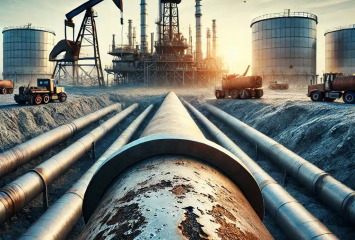
Corrosion Control in Petroleum Production Facilities
Corrosion Control in Petroleum Production Facilities Training Course

Corrosion Control in Petroleum Production Facilities Training Course
Introduction to Corrosion: Understanding the basics of corrosion, its types, and its impact on petroleum production facilities.
Corrosion Mechanisms: Detailed examination of the mechanisms that cause corrosion in oil and gas production environments.
Materials of Construction: Overview of materials used in petroleum production and their susceptibility to corrosion.
Corrosion Monitoring: Techniques and methods for monitoring corrosion, including inspection and testing procedures.
Corrosion Control Methods: Various methods to control and mitigate corrosion, such as coatings, cathodic protection, and chemical inhibitors.
Risk-Based Inspection (RBI): Implementing RBI strategies to prioritize and manage corrosion risks effectively.
Case Studies: Practical case studies to illustrate real-world corrosion control challenges and solutions.
Regulatory Compliance: Understanding industry standards and regulations related to corrosion control in petroleum production.
Advanced Techniques: Exploring advanced techniques and technologies for corrosion monitoring and control.
Understanding Corrosion Mechanisms: Learn about the fundamental mechanisms that cause corrosion in petroleum production facilities.
Materials of Construction: Gain knowledge of the materials used in petroleum production and their susceptibility to corrosion.
Corrosion Monitoring: Develop skills in monitoring and inspecting corrosion, including the use of various techniques and tools.
Corrosion Control Methods: Understand and apply various methods to control and mitigate corrosion, such as coatings and cathodic protection.
Risk-Based Inspection (RBI): Implement RBI strategies to prioritize and manage corrosion risks effectively.
Cost of Corrosion: Learn about the economic impact of corrosion and how to minimize these costs through effective control measures.
Advanced Techniques: Explore advanced techniques and technologies for corrosion monitoring and control.
Regulatory Compliance: Stay informed about industry standards and regulations related to corrosion control in petroleum production.
Introduction to Corrosion: Understanding the basics of corrosion, its types, and its impact on petroleum production facilities.
Corrosion Mechanisms: Detailed examination of the mechanisms that cause corrosion in oil and gas production environments.
Materials of Construction: Overview of materials used in petroleum production and their susceptibility to corrosion.
Corrosion Monitoring: Techniques and methods for monitoring corrosion, including inspection and testing procedures.
Corrosion Control Methods: Various methods to control and mitigate corrosion, such as coatings, cathodic protection, and chemical inhibitors.
Risk-Based Inspection (RBI): Implementing RBI strategies to prioritize and manage corrosion risks effectively.
Case Studies: Practical case studies to illustrate real-world corrosion control challenges and solutions.
Regulatory Compliance: Understanding industry standards and regulations related to corrosion control in petroleum production.
Advanced Techniques: Exploring advanced techniques and technologies for corrosion monitoring and control.
Production Managers
Corrosion Engineers
Production and Processing Engineers
Material Engineers
Chemists
Reliability Engineers
Operators